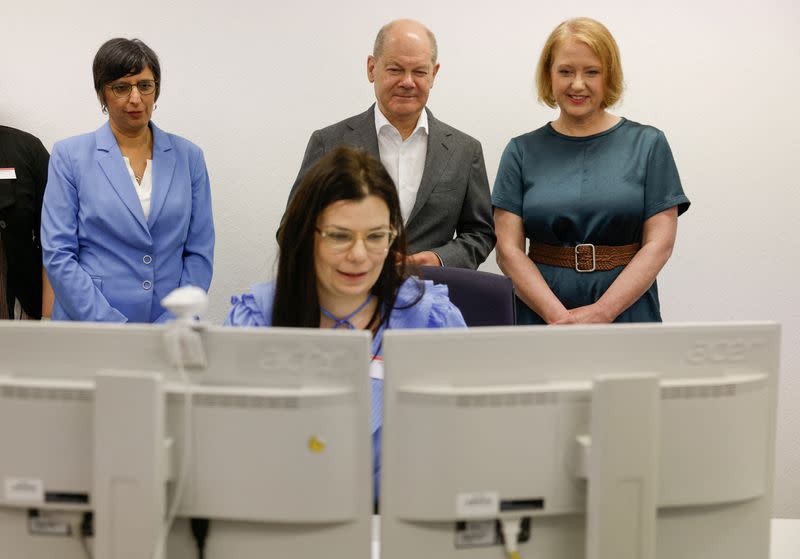Germany leaves women's labour power untapped

By Maria Martinez
BERLIN (Reuters) - With a rapidly ageing population, Germany is urgently looking at how it can get more work from a labour force that enjoys the most ample leisure time in the rich world. But analysts say it is overlooking one vital, untapped resource: its women.
Government measures announced this month include tax incentives to encourage overtime and later retirement, plus a 2-billion-euro ($2.2 billion) investment in childcare to help more mothers into the workplace.
But even with that, labour market experts say the package does not go nearly far enough to address deep-rooted obstacles in the tax system and longstanding cultural norms which are still keeping many women at home.
"For me the big missed opportunity was to really think much more seriously about how we can incentivise women to work more," Nicola Fuchs-Schuendeln, Chair for Macroeconomics and Development at the Goethe University Frankfurt, told Reuters.
Germany's ageing demographics mean its labour force is shrinking by 400,000 workers a year in what Chancellor Olaf Scholz's government acknowledges is a major long-term threat to Europe's largest economy and its public finances.
Foreign workers have been a major piece of Germany's workforce for decades and the coalition aims to make it easier for migrants to enter the job market with measures including tax incentives for skilled workers and work permits for refugees.
However, with a national election next year and the anti-immigrant Alternative for Germany polling in second place, the politics around migrant workers is changing shape, prompting a search for alternatives.
The challenge is significant. According to the Organisation for Economic Co-operation and Development, average annual hours per worker in Germany stood at 1,343 in 2023 - the lowest among the 38 advanced economies in the OECD club.
Enzo Weber, researcher at the Institute for Employment Research, said although participation by women and students in the German labour market is high, much of it is part-time, decreasing the average hours per worker.
European Union data show that while labour force participation by German women is better than in most EU countries, 47% of them work part-time - well above the bloc's average of 28%.
"Our high labour market participation rate does not compensate for these low working hours," said Holger Schaefer, senior economist at the German think tank IW. "As a result, we make less use of our labour force potential than most other countries."
One reason for this goes back decades. In 1958, the then-West Germany introduced a tax benefit for married couples to reflect the status of marriage and family in the constitution.
A couple is taxed as a single unit. In practice, this means many women end up being taxed at the marginal rate of their partner - lowering the incentive to work in couples where the man is the top earner.
A second factor is so-called "mini-jobs", created in the labour reforms of the 2000s which exempt from tax any job paying a monthly wage of 538 euros or less.
Around 4.3 million women in Germany have a mini-job. But if they increase their hours - and hence wages - taxation and social contributions kick in, taking a chunk out of earnings.
Thirdly Germany, like other countries, has an acute lack of childcare - in its case an estimated shortfall of 400,000 places.
"The shortage of pre- and post-school childcare places may be a more significant barrier to part-time parents increasing their hours in Germany than elsewhere," said Andrew Kenningham, chief Europe economist at Capital Economics.
UNINTENDED CONSEQUENCES
Some analysts have raised concerns that the new measures could unintentionally create further barriers for women.
There will be tax incentives for full-time workers - who are mostly men - to increase their working hours.
"If men even increase their full time further by two or three hours, then the margin for women in the partnership to work becomes even smaller," said Weber of the Institute for Employment Research.
On top of these economic factors come social and cultural ones which may prove equally difficult to address.
While studies show most people in Europe would work less if they could, German workers - with average net earnings of 38,000 euros per year compared to the EU average of 28,200 - are simply more able to do so if they choose.
Conservative social norms, particularly in West Germany, according to which a child is better off being cared for by the mother, also play a role. While 45% of mothers in East Germany work full-time - an after-effect of the German Democratic Republic which upheld the model of the working mother - only 19% of West German mothers do, an IW study shows.
The labour package includes incentives for employers to pay bonuses to employees who expand their part-time hours, but economists doubt this will sway those women with the financial means to prioritise their free time.
When Jennifer Hart, a 38-year-old government adviser, returned to work after her baby was born, she began with 50% of full time hours, increasing to 32 hours per week when her child was one and a half.
The salary cut was substantial and her main worry is that she is also paying less into her pension.
Women in Germany receive a third of the retirement income of their male counterparts, in what has been called the "gender pension gap." One in five women aged 65 or over is at risk of poverty in Germany, compared with 17.5% of the men, according to statistics office data.
But still, Hart said increasing her working hours is not an option while her child is still young.
"Part time to me is a choice to spend more time with my kid and make logistics around day care possible," she told Reuters. "I doubt taxes can change that."
($1 = 0.9211 euros)
(Reporting by Maria Martinez; Editing by Mark John and Toby Chopra)





